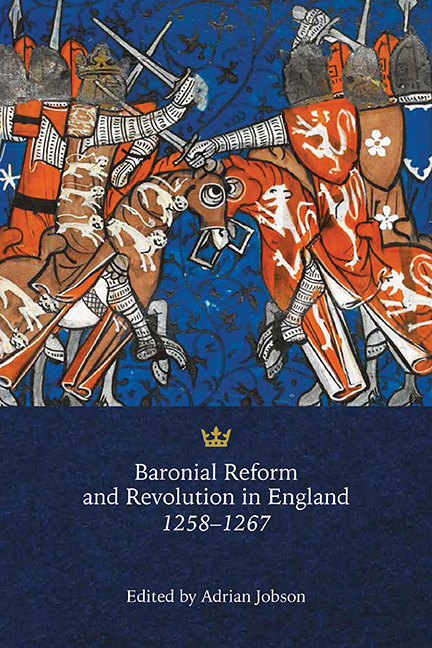Book contents
- Frontmatter
- Dedication
- Contents
- List of Illustrations
- Acknowledgements
- List of Abbreviations
- Introduction
- Modern Historians and the Period of Reform and Rebellion, 1258–1265
- The Secret Revolution of 1258
- Baronial Reform, the Justiciar’s Court and Commercial Legislation: The Case of Grimsby
- Crisis Management: Baronial Reform at the Exchequer
- Local Administration during the Period of Reform and Rebellion
- What Happened in 1261?
- Writing Reform and Rebellion
- Civic Government in Troubled Times: London c.1263–1270
- The Montfortian Bishops
- Reformers and Royalists: Aristocratic Women in Politics, 1258–1267
- The Midlands Knights and the Barons’ War: The Warwickshire Evidence
- Retinues, Agents and Garrisons during the Barons’ Wars
- The Barons’ War in the North of England, 1264–1265
- The Maritime Theatre, 1258–1267
- Reasserting Medieval Kingship: King Henry III and the Dictum of Kenilworth
- Index
Local Administration during the Period of Reform and Rebellion
Published online by Cambridge University Press: 21 May 2021
- Frontmatter
- Dedication
- Contents
- List of Illustrations
- Acknowledgements
- List of Abbreviations
- Introduction
- Modern Historians and the Period of Reform and Rebellion, 1258–1265
- The Secret Revolution of 1258
- Baronial Reform, the Justiciar’s Court and Commercial Legislation: The Case of Grimsby
- Crisis Management: Baronial Reform at the Exchequer
- Local Administration during the Period of Reform and Rebellion
- What Happened in 1261?
- Writing Reform and Rebellion
- Civic Government in Troubled Times: London c.1263–1270
- The Montfortian Bishops
- Reformers and Royalists: Aristocratic Women in Politics, 1258–1267
- The Midlands Knights and the Barons’ War: The Warwickshire Evidence
- Retinues, Agents and Garrisons during the Barons’ Wars
- The Barons’ War in the North of England, 1264–1265
- The Maritime Theatre, 1258–1267
- Reasserting Medieval Kingship: King Henry III and the Dictum of Kenilworth
- Index
Summary
The baronial reform movement of 1258, and the subsequent descent into civil war, were inextricably bound up with the localities. The reform of local administration and the inquiries into past abuses in the counties constituted a central pillar of the reforming programme. The magnate leaders of the reformist movement were not concerned solely with their own interests, but also addressed the grievances of the local landed classes with Henry III's governance. In turn, this helps to explain the support of local society, not just the knights but even members of the peasantry, for Simon de Montfort during the Barons’ War. In its narrowest sense, administrative history is concerned with the organisation, structure and processes of government. This is valuable on a purely practical level, since it is essential to understand the technical details of these administrative procedures in order fully to utilise the primary source material. It is most effective, however, when placed within a broader political and socio-economic context.
Thirteenth-century England boasted a variety of administrative structures. In terms of public administrative units, the basic divisions were the counties, the hundreds and the communal courts of the vill and borough. Parallel to these stood a private ‘feudal’ hierarchy of the honour and manor. Alongside these secular structures came a corresponding ecclesiastical administration. Moreover, these were all intermixed. Most notably, the king was at the head of both the public and private hierarchies, while numerous public hundreds were in private hands, and both lay and ecclesiastical lords exercised public duties in their own private liberties. The gentry played a vital role in local administration, not just as holders of local office, but also as suitors to local courts, as recipients of royal commissions and, increasingly, as jurors. This essay will focus specifically on local (royal) administration as opposed to a broader concept of local governance incorporating the vital role played by private alongside public structures of power and authority. While the latter can only really be addressed as part of a detailed local study, the following will draw on the case study of Essex to illustrate the former in more detail.
- Type
- Chapter
- Information
- Baronial Reform and Revolution in England, 1258-1267 , pp. 71 - 88Publisher: Boydell & BrewerPrint publication year: 2016



